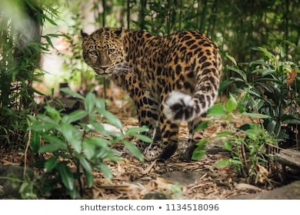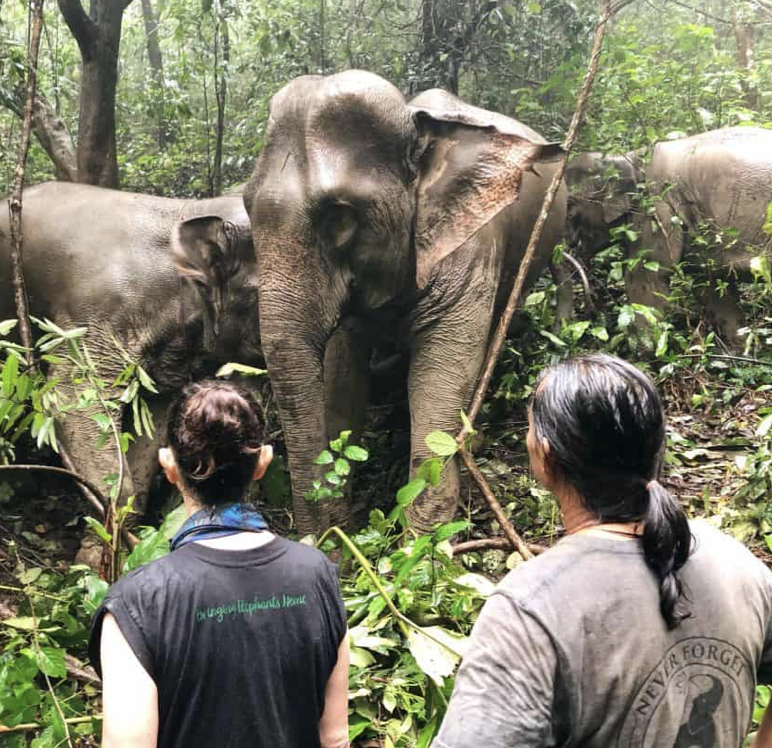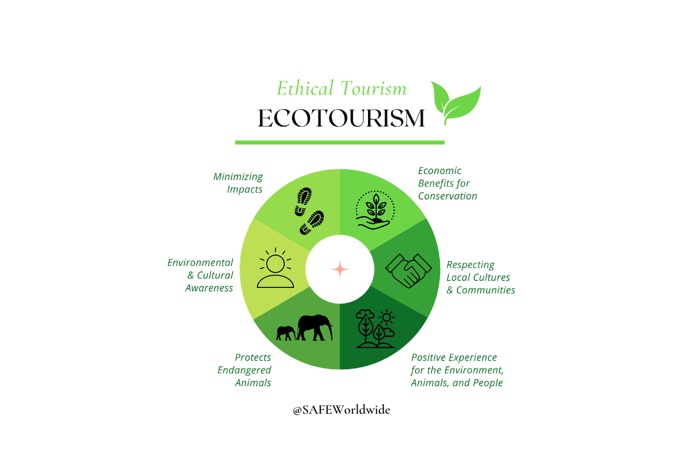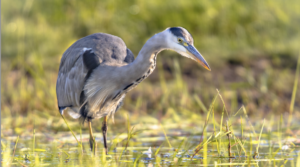
A Gentle and Kinder Way to Travel – Respecting Wildlife and Nature

admin - Main

What is ecotourism?
Ecotourism is a broad umbrella term encompassing the idea that tourists will be able to experience the natural world as it is without leaving their “human footprint” behind. Furthermore, the positive impact of ecotourism through economic funds allows for further conservation efforts, supports the local community, and spreads education about the environment and the wildlife of that region. Ecotourism respects the local communities, cultures, and languages through actions that are approved and supported by locals only. It is about sustainability in all parts of tourism. In other words, ecotourism is responsibly traveling!

Minimizing Our Impact
Going on vacation is often one of the most exciting parts of our lives. We are taking a break from our 9-5 to sit back, relax and enjoy time with people we love or with ourselves. Unfortunately, tourism has an extensively long history of negatively impacting people, animals, and the environment if not done respectfully and correctly. Highlighting the impact on wildlife, tourism is a large player in habitat loss and destruction. To make room for hotels, roads, and resorts many forests and natural areas had to be destroyed. Tourism that focuses on the beauty of nature, if done excessively can lead to a loss in biodiversity of plants and animals. Such habitat loss does not only affect possible endangered animals and plant life but can threaten the way local communities collect food, medicine, and other resources.
Tourism can also become extreme. Trophy hunting, the act of hunting exotic animals for showmanship, is a tourist activity that is often debated as a way to “fund” conservation efforts. Animals are being hunted on savannahs in Africa and beyond for payment. This increases the desire for more of these ranches to occur in places easily accessible to many hunters such as America. America has thousands of trophy hunting farms where animals from Africa and many other regions are imported simply for sport (read our article on Trophy Hunting here). As you can see this is fueling a dark and dangerous industry and should not be part of a positive tourism experience.
Minimizing our impact is extremely important for all parties involved in tourism. It allows people to come to new areas to experience amazing things but allows for the communities, animals, and environment to be left the way it was with minimal outside influence. Minimizing your impact while traveling will keep you from destabilizing ecosystems that thousands of people and animals rely on for survival. This is perhaps the biggest key in ecotourism: providing only positive impacts and leaving the region you visit without a damaging footprint behind you.
Ways to Reduce your Impact While Traveling
- Bring Reusable Tools: Reusable water bottles, hygiene products, bags, etc. This way you will not have to worry about leaving behind as much waste. Make sure to always pick up after yourself and dispose of trash responsibly.
- Search for Eco-Friendly Lodging: whenever possible find lodging that uses reusable energy, locally sourced food, is supported by the local community, and recycles. Plus any other eco-friendly activity.
- Eat Seasonally & Locally: when visiting a new place make sure that you order food that is in season and local. This way you are supporting local farmers and not contributing to food waste.
Economic Benefits of Ecotourism
Tourism is a huge industry and is vitally important to many of the world’s economies. Without funding from tourists, many conservation programs would be drowning in efforts to support endangered species. Not to mention tourism provides a healthy stream of currency to local communities, businesses, and families that support themselves in the tourist industry and beyond. Tourism can provide local jobs, educational opportunities, and local programs. Make no mistake, tourism is important but it must be done ethically.
Furthermore, tourism is a key component of conservation efforts protecting the most endangered animals in the world. For example, almost all species of lemurs in Madagascar are considered endangered. Madagascar itself is an impoverished country and without tourism, it is likely many conservation efforts would not be in place to protect these lively animals. Tourism has allowed for multiple avenues of innovation in Madagascar that have helped lemur conservation efforts. Not only does currency from tourism go directly to the endangered animals, but the economic benefits also allow for the local people of Madagascar to find alternatives to “slash and burn” agriculture that many relied on for economic survival. These and other agriculture practices have been relied on by the people of Madagascar, but it has also contributed greatly to the habitat loss of lemurs (Lemur Conservation Effort). With a strong, sustainable, and responsible tourism industry in Madagascar, locals were able to find jobs and have economic success in areas outside of dangerous agricultural practices allowing for the preservation of lemur habitats.
Respect and Awareness
Two important words that are part of ecotourism: respect and awareness. With respectful tourism, we as visitors are making sure that we understand the cultures that we are visiting. We are being welcomed by local communities and it is with their permission that we have access to view natural wonders, wild animals, and beautiful places around the world. As travelers, it is important to respect the regions we visit by leaving only positivity behind. We must leave minimal impact to the region and respect languages, customs, and laws. Prepare! Do not blindly go into a new area without any idea of the people or the natural world that it is a part of. Educate yourself on customs and etiquette, always being polite and observant before being invited to participate. Respect local sites by only going where a responsible guide allows. Leave no trash behind and be willing to learn. It is important to do research beforehand to ensure the tourist organizations you are using are ethical and respectful. Being a kind tourist makes everyone’s experience better including your own.
Ecotourism brings awareness of issues both in the natural world and societal world to the forefront of a traveler’s mind. People from around the world will be able to “see” the problems of climate change, social injustice, development, etc., and be able to connect with it better. Seeing gorillas for the first time in the wild will make you truly understand the likeness we share and the intrinsic importance of saving such a beautiful species. Tourists that responsibly visit regions will have the chance to become aware of cultures outside of their own, fostering understanding and tolerance. For many people in cities and suburbia, it is easy to be removed from environmental problems like climate change or habitat destruction. But ecotourism allows for people to visit more rural and natural regions responsibly and to see first hand the environmental issues that are affecting people around the world. This highlights the importance of spreading awareness and being active against climate change, habitat destruction, poaching, and other environmental impacts. It is with these experiences that we hope people become activists for a more healthy world, one where animals and people are protected.
Ethical Tourism & Protecting Animals
Lastly, ecotourism is built upon a balanced relationship between the human world and the natural world. It allows support on both sides but keeps boundaries up to allow for conservation. Ecotourism can motivate tourists to support endangered animals and spread educational awareness about the plights that they face. Ethical travel organizations have allowed for hundreds of species to become protected while still spreading awareness, education, and even tourism to outsiders. For example, African savannahs led by the Lion Recovery Fund empower conservation efforts on the ground for these big cats. The Global Penguin society is doing a similar ecotourism exchange as well (Wild Net). Programs such as these support the expansion and development of ethical tourism groups and trips. They do not have tourism groups in regions where they may harm habitats or inadvertently wildlife, they do not support unethical souvenirs, and they educate groups on how they can help wildlife themselves. Furthermore, the money that is spent to attend such groups by tourists goes into conservation and communal funds as we have highlighted before.
Ecotourism has many sectors: conservation, cultural respect, economic benefits, and more. With our world beginning to open up again, it is the perfect time to make a change and make sure this new world is one of respect and conservation. It is up to tourists from western nations and beyond to make conscious and responsible decisions about where they are going to be traveling and how they can responsibly travel with minimal impact to local communities, environments, and wildlife while simultaneously supporting them through education, economic funds, and awareness. Choose responsibly when you are getting ready for your next trip, the world, its people, and its wildlife will thank you!
Check Out these Organizations
CREST: Check out CREST an awesome organization using research and education to highlight ecotourism.
Sumak Travel: Sumak has great information on traveling ethically in Argentina, Chile, and other countries.
SAFE Worldwide: Check out our website for ideas on places you can responsibly travel and volunteer for the betterment of wildlife.
Resources
Herzl, R. (2019, June 21). Ethical Ecotourism is Good for Conservation. Retrieved April 18, 2021, from https://wildnet.org/ethical-ecotourism-is-good-for-conservation/
Romberg, C. (2021, March 08). Saving Lemurs with Ecotourism to Madagascar. Retrieved April 16, 2021, from https://www.lemurconservationnetwork.org/saving-lemurs
Disclaimer: The opinions, beliefs and viewpoints expressed by the various authors and forum participants on this web site are their own and do not necessarily reflect the opinions, beliefs and viewpoints of SAFE Worldwide.





